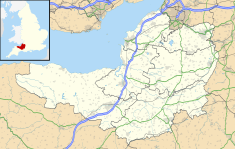The Church of St Andrew in Chew Magna, Somerset, England dates from the 12th century with a large 15th-century pinnacled sandstone tower, a Norman font and a rood screen that is the full width of the church. It is a Grade I listed building.[1]
| Church of St Andrew | |
|---|---|
 | |
| Location | Chew Magna, Somerset, England |
| Coordinates | 51°22′00″N 2°36′35″W / 51.36667°N 2.60972°W |
| Built | 12th century |
Listed Building – Grade I | |
| Designated | 21 September 1960[1] |
| Reference no. | 1129613 |
History edit
The church was restored in 1860 and has a register commencing in 1562. The tower is about one hundred feet tall and was probably built about 1440.[2][3] There has been a clock on the tower since the early 18th century. There is a peal of eight bells in the tower. Tenor 28 cwt in C. The original five bells were re-cast by the celebrated Thomas Bilbie of Chew Stoke in 1735 to make a peal of six,[4] and in 1898 four of these were re-cast and two were repaired by Messrs. Mears and Stainbank of London to commemorate the Diamond Jubilee of Queen Victoria. Two additional bells, the gift of Brigadier Ommanney, were added in 1928 to complete the octave, which still contains two of the Bilbie bells. The present clock, installed in 1903, plays a verse of a hymn every four hours, at 8 am, noon, 4 and 8 pm, with a different hymn tune for every day of the week.[5]
It is next to Chew Court which was originally a palace for Gisa the Bishop of Bath and Wells,[6]
Thomas Minor was baptized in St. Andrew's in 1608. A modern plaque is mounted on St. Andrew's wall to commemorate the events [7] He then migrated to America in 1629, becoming one of the founders of Stonington, CT.[8] The Thomas Minor Society[9] documents his history and genealogy.
The church is within the joint benefice with the Church of St Michael, Dundry and Holy Trinity Church, Norton Malreward.[10]
Churchyard edit
The churchyard contains several monuments which are Grade II listed buildings in their own right: the churchyard cross,[11] Edgell monument,[12] Fowler monument[13] and a group of three unidentified monuments.[14] In addition there is an early 19th-century limestone round-topped stone which bears the inscription to William Fowler "shot by an Highwayman on Dundry Hill June 14th 1814 aged 32 years",[15] and Commonwealth war grave of a Royal Air Force officer of World War II.[16]
Interior memorials edit
Within the church are wooden plaques commemorating the nineteen people from the village who died in World War I[17] and seven from World War II,[18] and a bronze plaque to an individual soldier who died in 1917.
In the church are several memorials to the Stracheys of Sutton Court together with a wooden effigy of a Knight cross-legged and leaning on one elbow, in 15th-century armour, thought to be of Sir John de Hauteville or a descendant, and possibly transferred from a church at Norton Hautville before it was demolished.[19] Another effigy in the north chapel is of Sir John St Loe, who was over 7 feet (2 m) tall,[20] and his lady. The armoured figure is 7 feet 4 inches (2.24 m) long and his feet rest on a lion, while those of his lady rest on a dog. The church also houses the final resting place of Sir Edward Baber (1530-1578) son of Sir John Baber. He was Sergeant at Law and husband to Lady Catherine Leigh-Baber, the daughter of Sir Thomas Leigh, Lord Mayor of London under Queen Elizabeth I.[21]
See also edit
References edit
- ^ a b Historic England. "Church of St. Andrew (1129613)". National Heritage List for England. Retrieved 9 May 2006.
- ^ Pevsner, Nikolaus (1958). The Buildings of England : North Somerset and Bristol. Penguin Books. ISBN 0-300-09640-2.
- ^ Poyntz Wright, Peter (1981). The Parish Church Towers of Somerset, Their construction, craftsmanship and chronology 1350 - 1550. Avebury Publishing Company. ISBN 0-86127-502-0.
- ^ Moore, James; Rice, Roy; Hucker, Ernest (1995). Bilbie and the Chew Valley clock makers. The authors. ISBN 0-9526702-0-8.
- ^ "The history of St Andrews Church Chew Magna". Archived from the original on 5 February 2012. Retrieved 12 May 2006.
- ^ "Archaeological Monitoring during development at Chew Court, Chew Magna, Bath & NE Somerset" (PDF). Bath and North East Somerset. Retrieved 28 December 2012.
- ^ "History of St. Andrew's Church".
- ^ "Thomas Minor Society » About the Society".
- ^ http://tmsociety.org
- ^ "About Dundry". Parish of Dundry. Archived from the original on 2 October 2011. Retrieved 3 December 2010.
- ^ Historic England. "Churchyard cross (1135956)". National Heritage List for England. Retrieved 9 May 2006.
- ^ Historic England. "Edgell monument (1129616)". National Heritage List for England. Retrieved 9 May 2006.
- ^ Historic England. "Fowler monument (1135977)". National Heritage List for England. Retrieved 9 May 2006.
- ^ Historic England. "Group of 3 unidentified monuments (1320740)". National Heritage List for England. Retrieved 9 May 2006.
- ^ "Rising Main and Sewage Pumping Station, Chew Magna, North East Somerset. Phase 1: Trial pits and boreholes. An Archaeological Watching Brief" (PDF). ContextOne. Archived from the original (PDF) on 20 August 2007. Retrieved 19 September 2007.
- ^ "Pilot Officer Thomas Birkett, casualty record". Commonwealth War Graves Commission. Retrieved 23 February 2019.
- ^ "Chew Magna WWI Ref: 7490". United Kingdom National Inventory of Ward Memorials. Retrieved 19 May 2006.
- ^ "Chew Magna WWII Ref: 7491". United Kingdom National Inventory of Ward Memorials. Retrieved 19 May 2006.
- ^ Mason, Edmund J. & Mason, Doreen (1982). Avon Villages. Robert Hale Ltd. ISBN 0-7091-9585-0.
- ^ Leete-Hodge, Lornie (1985). Curiosities of Somerset. Bodmin: Bossiney Books. p. 20. ISBN 0-906456-98-3.
- ^ Historic England. "Church of St Andrew (1129613)". National Heritage List for England. Retrieved 10 January 2019.
